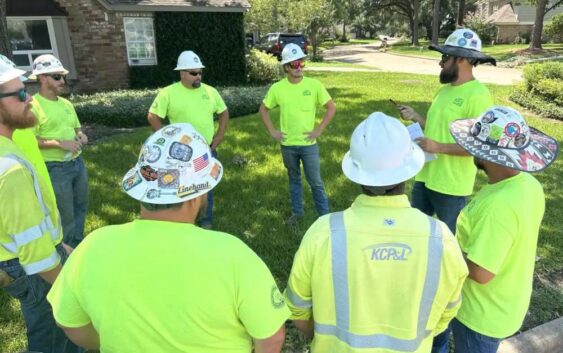- CenterPoint Energy accelerates infrastructure improvements ahead of hurricane season
- Carolina Hurricanes playoff tickets go on sale Thursday
- Ask the Meteorologist: Why do tornadoes target Tornado Alley, Dixie Alley?
- Nonprofit closes distribution site that aided thousands after Hurricane Helene
- Trump approves federal assistance amid Arkansas flooding
CenterPoint ‘rapidly losing faith and trust’ with communications decisions after Hurricane Beryl, PR expert says

From Houston Public Media:
Molly McPherson was deployed to Houston during Hurricane Ike in 2008, when she worked for the Federal Emergency Management Agency (FEMA), so she knows what it’s like to lose electricity during the summer in southeast Texas.
The Massachusetts-based crisis communications strategist also works with utility companies, so she understands why CenterPoint Energy is taking heat from Houston-area residents and elected officials in the aftermath of Hurricane Beryl. More than 1 million of its customers remained without power midday Thursday – three days after the deadly storm blew the region, knocked down trees and caused widespread flooding – and the company has yet to provide many specifics about when their service will be restored.
Meanwhile, the Houston area is under a heat advisory, with temperatures above 90 degrees and heat indexes topping 100, according to the National Weather Service.
“There is no quicker way to go from a utility that is loved to hated than when there isn’t any power,” McPherson said. “People living without power under intense circumstances, intense heat, is going to create an emotional state where nothing will make them happy until power is restored. The only way to restoring trust is by restoring power.”
RELATED: Houston-area residents share their Hurricane Beryl photos, experiences
McPherson said CenterPoint is “rapidly losing faith and trust” from its customers while adding that the new outage map rolled out late Tuesday by the company is “working against the utility by letting people know how poor the service is.”
CenterPoint removed its original online outage map, which was color-coded to indicate when impacted residents could expect to get their power restored, after a deadly mid-May windstorm knocked out electricity for more than 900,000 homes, schools and businesses. That was another point of criticism in the immediate aftermath of this week’s storm, with a social media user noting that the map feature on the Whataburger app could serve as a de facto outage map because it indicated which 24-hour fast-food restaurants were open and which were closed.
Doug Lewin, an Austin-based energy consultant and author of the Texas Energy and Power Newsletter, said there was “no excuse” for CenterPoint to not have an outage map. He also said the company’s communications to this point “have not been good.”
CenterPoint’s outage map returned in a different format Tuesday night, showing which areas had power, which were assigned for repairs and which were still being assessed, but not indicating when outages were expected to be restored. And its accuracy was widely criticized by customers on social media.
Bill Kelly, a First Ward resident who worked for former Houston mayors Bill White and Sylvester Turner, said the new outage map showed that power had been restored to his neighbor who works as a lineman for CenterPoint. But that was not actually the case, according to Kelly, who said the situation reminded him of an emergency response meeting led by White during the aftermath of Hurricane Katrina in 2005.
A national nonprofit organization included in the meeting was prepared to publicize an assistance hotline it created when White asked Kelly to dial the number himself to see if it worked. It did not, which prompted the nonprofit to circle back and correct the issue before providing the phone number to the public, Kelly said.
“Accuracy matters a great deal,” Kelly said. “For CenterPoint, No. 1, to not have a map, and No. 2, to put out a map that’s riddled with inaccuracies, it doesn’t give the public confidence at all.”
McPherson said the company needs to provide clear expectations for power restoration in order to regain trust and also needs unified messaging from its leadership.
Above all, McPherson said, CenterPoint needs to get people’s lights and air-conditioners back on. Depending on how long that takes, it still might not be enough to satisfy exhausted, overheated and stressed-out Houstonians.
“They’re dealing with a wave of public outcry that just dominates a news cycle,” McPherson said. “It’s more difficult for energy providers to restore their reputations in a massive outage when they fall short than it is for them to restore power to customers.”
RELATED: Cooling centers, shelters open across Houston area in aftermath of Hurricane Beryl
Elected officials at the local and state levels have said they will hold CenterPoint accountable after more than 2.2 million of its residential and commercial customers – representing about 80% of its customer base in the region – lost power during the peak of Monday’s storm. Officials from the company have said they did not anticipate the Category 1 hurricane causing as much infrastructure damage as it did, while also noting that CenterPoint has enlisted more than 12,000 restoration personnel from Texas as well as several other states.
As of Wednesday afternoon, power had been restored to nearly 950,000 of the CenterPoint customers who lost it. The company said in a news release that it realizes the remaining customers “need information about the status of their service” as much of the criticism directed at CenterPoint has centered around a lack of specifics about which parts of the region are most impacted and when electricity will be restored.
“As the company continues its progress on damage assessment, it expects to provide more specific estimated restoration times beginning (Thursday) morning,” CenterPoint said.